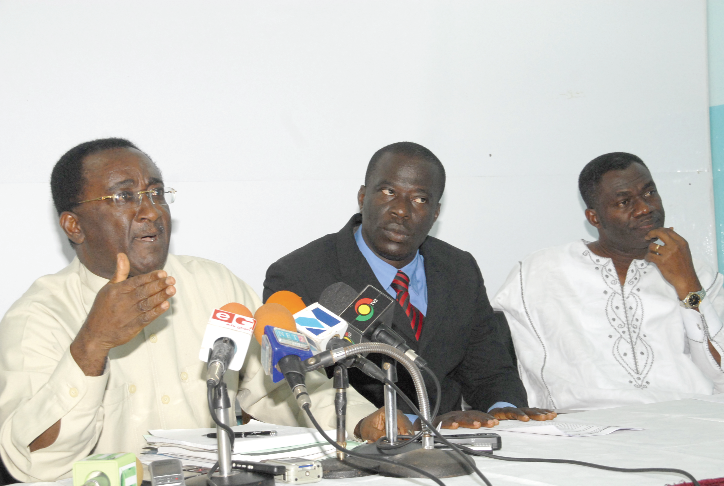Turn around poor performance in agriculture - Minority tells government
 The Minority in Parliament has called on the government to take measures to turn around the poor agricultural performance, if the country is to avoid social and economic disaster.
The Minority in Parliament has called on the government to take measures to turn around the poor agricultural performance, if the country is to avoid social and economic disaster.
Advertisement
It said the poor annual growth (2.5 per cent average in the last three years) in agriculture, compares unfavourably with an oil-driven average growth of some 10 per cent in the general economy during the period.
“Such a huge growth differential between the economy and agriculture signals the onset of the Dutch Disease,” it said.
Addressing a press conference in Accra yesterday, the Minority Spokesperson on Food, Agricultural and Cocoa Affairs, Dr Owusu Afriyie Akoto, said the country’s agriculture growth had been grinding to a virtual halt since the 2007 farming season.
“From negative 1.7 per cent in drought-hit 2007, agricultural growth recovered strongly to 7.4 per cent in 2008, 7.2 per cent in 2009 and then slowed to 5.3 in 2010. Growth hit the bottom of 0.8 per cent in 2011, and then stayed down at 1.3 per cent in 2012”.
In a statement dubbed “The collapsing fortunes of Food and Agriculture in Ghana”, Dr Akoto said the drastic slowdown of agricultural growth meant rising unemployment, increasing malnutrition and deepening poverty”.
Stagnant Food and Agriculture Production
Dr Akoto explained that the production of basic food staples (cereals, legumes, roots and tubers) had seen stagnant growth in the last few years, adding that the situation had reduced food security in the country.
He said the fluctuations witnessed largely in the production of maize and rice and the sharp increase in imports of rice from 395,400 metric tonnes in 2008 to 543,465 metric tonnes in 2011, that is 37.5 per cent in just three years, attested to the deepening food insecurity in the country.
Dr Akoto indicated that the production of meat and fish, which contributes to the bulk of protein supply to Ghanaian consumers, had been stagnant in recent years with corresponding increase in imports to meet rising domestic demands.
He explained that imports of livestock and poultry products had risen from about 128,000 metric tonnes in 2008 to about 140,000, in spite of the very punitive levy imposed on the importation of poultry products.
Cocoa production
Touching on the production of cocoa, Dr Akoto said the country attained a peak production of just over one million metric tonnes in 2011 and attributed the achievement to policies and programmes initiated and implemented by the NPP administration.
He said the mass cocoa spraying exercise, among other measures, witnessed the doubling of cocoa production from 360,000 metric tonnes in the 2001/2002 cocoa season to 740,458 metric tonnes by 2005/2006 and then to one million metric tonnes in 2010/2011.
Dr Akoto stated that since the attainment of that record production, there had been a fall in output to 879,000 metric tonnes in the 2011/2012 crop season, adding that there was an indication that the production of the current 2012/2013 crop was likely to yield only 800,000 metric tonnes which reflected the poor implementation of policies pursued by the NDC administration in the past four years.
Budget Allocation to Agricultural Sector
Dr Akoto said the GH¢340.8 million allocated to the Ministry of Food and Agriculture represented less than 2.2 per cent of the total budgetary allocation.
He said that compared to 3.8 per cent in 2010, 2.7 per cent in 2011 and 1.9 in 2012 and explained that such low allocations would not help to change the stagnant agriculture growth which had characterised the sector in recent years.
Supply of fertiliser and other inputs
Dr Akoto stated that millions of Ghanaian farmers and fishermen continued to suffer from low productivity because of inadequate supply of improved inputs ( seeds, fertiliser, agro-chemicals and premix fuel), lack of market and access to credit.
He said the mass smuggling of subsidised fertiliser and other farm chemicals across the borders to neighbouring countries was a clear testimony of the failure of farm input policies.
According to him, the 2013 Budget provided for the distribution of 180,000 metric tonnes of subsidised fertiliser to farmers compared to 170,000 supplied in 2012.
Dr Akoto said the plan to use computers to assist in the distribution of fertilisers and seeds as anticipated in the 2013 Budget had failed and called for a change in the use of the invoice system of payment to importers of fertilisers meant for distribution to farmers.
By Emmanuel Adu-Gyamerah/Daily Graphic/Ghana




